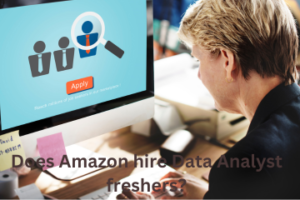Table of Contents
ToggleThere is no specific age requirement for becoming a data analyst. Data analysis is a field that primarily focuses on extracting insights and information from data sets, and individuals from various age groups can pursue a career in this field. Data analysts can be of any age as long as they possess the necessary skills, knowledge, and experience to perform the job effectively.
Typically, individuals interested in data analysis start by acquiring a strong foundation in mathematics, statistics, and computer science. They may pursue formal education such as a bachelor’s or master’s degree in fields like data science, statistics, mathematics, or a related discipline. However, it’s worth noting that a degree is not always a strict requirement, and some individuals enter the field through self-study, online courses, or specialized boot camps.
Experience in working with data, using analytical tools and programming languages (such as Python or R), and having knowledge of data visualization techniques are highly valued in the field of data analysis. So, while age is not a deciding factor, having the necessary skills and expertise is crucial to excel as a data analyst.
Data analysts are responsible for collecting, cleaning, and analyzing data to identify patterns, trends, and insights that can help organizations make informed decisions. They use various statistical techniques, data mining methods, and machine learning algorithms to extract meaningful information from data sets. They also work with databases, spreadsheets, and visualization tools to present their findings in a clear and understandable manner.
The field of data analysis is continuously evolving, with new technologies and methodologies emerging. As a result, data analysts often engage in continuous learning and professional development to stay updated with the latest tools and techniques. This includes keeping up with advancements in data analytics software, programming languages, and data visualization tools.
Learn the core concepts of Data Analytics Course video on Youtube:
The age at which someone becomes a data analyst can vary. Some individuals may enter the field early in their careers, while others may transition into data analysis later in life after gaining experience in related roles or industries. What matters most is a combination of relevant skills, knowledge, and a passion for working with data to drive meaningful insights and decision-making.
Education and Skills:
Academic Background: While a specific degree is not always required, a strong foundation in mathematics, statistics, and computer science is beneficial. Many data analysts have bachelor’s or master’s degrees in fields such as data science, statistics, mathematics, economics, or computer science.
Analytical Skills: Proficiency in statistical analysis, data manipulation, and problem-solving is crucial. A solid understanding of statistical concepts and experience with analytical tools and programming languages like Python, R, or SQL is highly desirable.
Data Visualization: Data analysts should possess the ability to effectively communicate insights through visualizations. Familiarity with tools like Tableau, Power BI, or Python libraries like Matplotlib and Seaborn can be advantageous.
Domain Knowledge: Depending on the industry, having domain-specific knowledge can be beneficial. For example, healthcare data analysts may benefit from understanding healthcare systems and terminology.
Professional Experience:
Internships and Projects: Gaining practical experience through internships or personal projects can provide valuable hands-on exposure to real-world data analysis scenarios.
Entry-Level Positions: Many data analysts start their careers in entry-level positions or as data analysts within larger teams. This allows them to learn from experienced professionals and expand their skills.
Continuous Learning: The field of data analysis is constantly evolving. Data analysts need to stay updated with the latest tools, techniques, and industry trends. Engaging in continuous learning through online courses, workshops, or professional certifications is common.
Industry Demand and Job Roles:
Diverse Industries: Data analysts are in demand across various industries, including finance, healthcare, e-commerce, marketing, technology, and more. Each industry may have its specific data needs and challenges.
Job Roles and Responsibilities: Data analysts may have different job titles and responsibilities based on the organization and industry. Some common roles include data analyst, business analyst, marketing analyst, financial analyst, and research analyst.
Career Progression:
Senior Data Analyst: With experience, data analysts can progress to senior roles where they handle more complex projects, lead teams, and provide strategic insights to senior management.
Data Science: Some data analysts transition into data science roles, which involve more advanced statistical modeling, machine learning, and predictive analytics.
Specializations: Data analysts can specialize in specific areas like marketing analytics, healthcare analytics, or financial analytics based on their interests and career goals.
Networking and Professional Development:
Networking: Building a professional network can be beneficial for career growth. Attending industry conferences, joining data analysis or data science communities, and connecting with professionals in the field can provide valuable insights, learning opportunities, and potential job prospects.
Professional Development: Data analysts can enhance their skills and knowledge through professional development opportunities. This can include attending workshops, webinars, or online courses to learn new techniques, tools, or programming languages.
Communication and Collaboration:
Effective Communication: Data analysts should be able to effectively communicate their findings and insights to both technical and non-technical stakeholders. This involves presenting complex information in a clear and concise manner, using data visualizations, reports, and presentations.
Collaboration: Data analysts often work in interdisciplinary teams, collaborating with data engineers, data scientists, business stakeholders, and other professionals. The ability to collaborate and work effectively as part of a team is essential.
Ethical Considerations:
Data Privacy and Security: Data analysts need to be aware of privacy and security concerns related to handling sensitive data. They should adhere to ethical guidelines, comply with relevant regulations, and prioritize data privacy and security in their work.
Bias and Fairness: Data analysts should be mindful of potential biases in data and analysis techniques. They should strive for fairness and avoid perpetuating discriminatory or biased practices when drawing conclusions or making recommendations.
Continuous Growth and Learning:
Keeping Up with Technology: The field of data analysis is rapidly evolving, with new technologies, tools, and methodologies emerging. Data analysts should stay updated with the latest advancements and continuously learn new skills to remain competitive in the job market.
Personal Projects and Side Ventures: Engaging in personal data analysis projects or exploring side ventures can provide opportunities to apply and expand skills, experiment with new techniques, and showcase expertise.
Data Science Placement Success Story
Data Science Training Institutes in Other Locations
Tirunelveli, Kothrud, Ahmedabad, Hebbal, Chengalpattu, Borivali, Udaipur, Trichur, Tiruchchirappalli, Srinagar, Ludhiana, Shimoga, Shimla, Siliguri, Rourkela, Roorkee, Pondicherry, Rajkot, Ranchi, Rohtak, Pimpri, Moradabad, Mohali, Meerut, Madurai, Kolhapur, Khammam, Jodhpur, Jamshedpur, Jammu, Jalandhar, Jabalpur, Gandhinagar, Ghaziabad, Gorakhpur, Gwalior, Ernakulam, Erode, Durgapur, Dombivli, Dehradun, Cochin, Bhubaneswar, Bhopal, Anantapur, Anand, Amritsar, Agra , Kharadi, Calicut, Yelahanka, Salem, Thane, Andhra Pradesh, Greater Warangal, Kompally, Mumbai, Anna Nagar, ECIL, Guduvanchery, Kalaburagi, Porur, Chromepet, Kochi, Kolkata, Indore, Navi Mumbai, Raipur, Coimbatore, Bhilai, Dilsukhnagar, Thoraipakkam, Uppal, Vijayawada, Vizag, Gurgaon, Bangalore, Surat, Kanpur, Chennai, Aurangabad, Hoodi,Noida, Trichy, Mangalore, Mysore, Delhi NCR, Chandigarh, Guwahati, Guntur, Varanasi, Faridabad, Thiruvananthapuram, Nashik, Patna, Lucknow, Nagpur, Vadodara, Jaipur, Hyderabad, Pune, Kalyan.
Data Analyst Courses In Other Locations
Tirunelveli, Kothrud, Ahmedabad, Chengalpattu, Borivali, Udaipur, Trichur, Tiruchchirappalli, Srinagar, Ludhiana, Shimoga, Shimla, Siliguri, Rourkela, Roorkee, Pondicherry, Rohtak, Ranchi, Rajkot, Pimpri, Moradabad, Mohali, Meerut, Madurai, Kolhapur, Khammam, Jodhpur, Jamshedpur, Jammu, Jalandhar, Jabalpur, Gwalior, Gorakhpur, Ghaziabad, Gandhinagar, Erode, Ernakulam, Durgapur, Dombivli, Dehradun, Bhubaneswar, Cochin, Bhopal, Anantapur, Anand, Amritsar, Agra, Kharadi, Calicut, Yelahanka, Salem, Thane, Andhra Pradesh, Warangal, Kompally, Mumbai, Anna Nagar, Dilsukhnagar, ECIL, Chromepet, Thoraipakkam, Uppal, Bhilai, Guduvanchery, Indore, Kalaburagi, Kochi, Navi Mumbai, Porur, Raipur, Vijayawada, Vizag, Surat, Kanpur, Aurangabad, Trichy, Mangalore, Mysore, Chandigarh, Guwahati, Guntur, Varanasi, Faridabad, Thiruvananthapuram, Nashik, Patna, Lucknow, Nagpur, Vadodara, Jaipur, Hyderabad, Pune, Kalyan, Delhi, Kolkata, Noida, Chennai, Bangalore, Gurgaon, Coimbatore.
For more information
360DigiTMG – Data Analytics, Data Science Course Training Hyderabad
Address – 2-56/2/19, 3rd floor,,
Vijaya towers, near Meridian school,,
Ayyappa Society Rd, Madhapur,,
Hyderabad, Telangana 500081
099899 94319
https://goo.gl/maps/sn21C9xFtMbCr4qm8
Source Link : What are the Best IT Companies in Uppal

